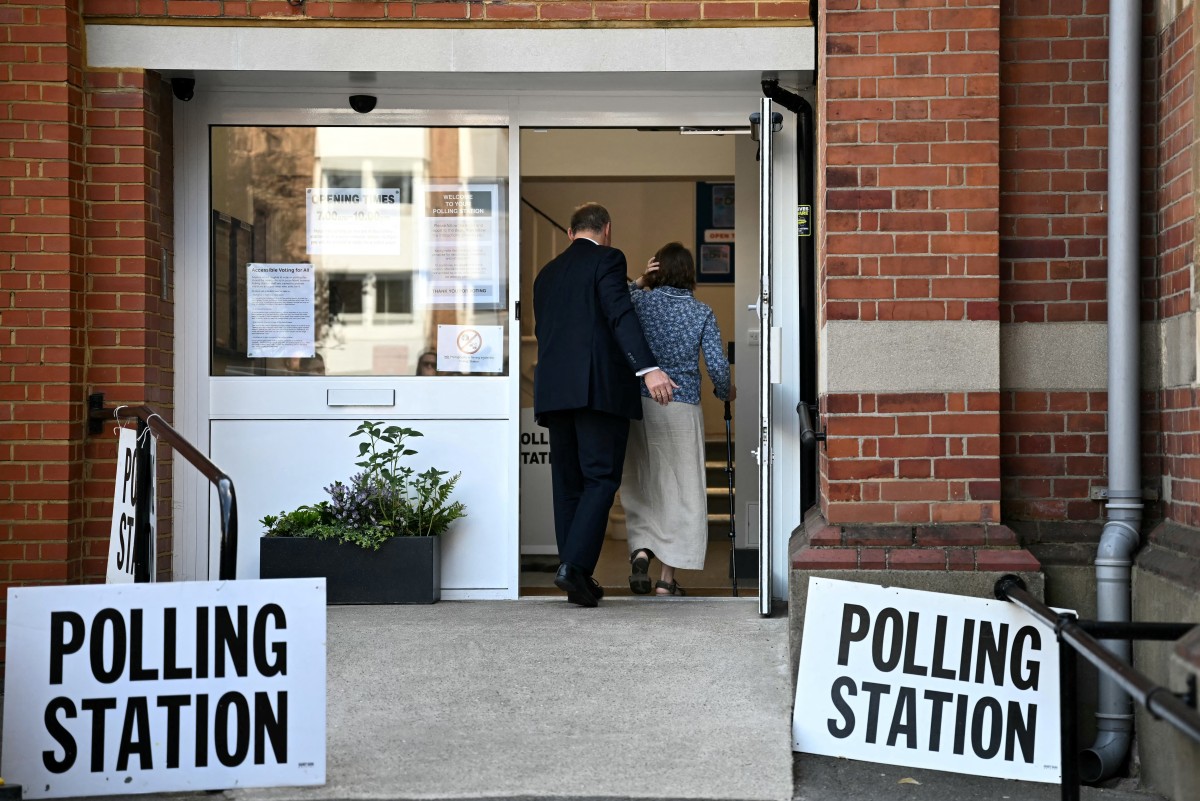Labour hoping for historic win as UK voters go to the polls
Britain voted Thursday in a general election that polls predict will hand the opposition Labour party a landslide win and end nearly a decade-and-a-half of Conservative rule. The first national ballot since Boris Johnson won the Tories a decisive victory in 2019 follows Prime Minister Rishi Sunak’s surprise call to hold an election six months […]

Britain’s Liberal Democrats party leader Ed Davey arrives with his wife Emily to cast their votes at a polling station at Surbiton Hill Methodist Church, southwest London, on July 4, 2024 as Britain holds a general election. (Photo by Ben Stansall / AFP)
Britain voted Thursday in a general election that polls predict will hand the opposition Labour party a landslide win and end nearly a decade-and-a-half of Conservative rule.
The first national ballot since Boris Johnson won the Tories a decisive victory in 2019 follows Prime Minister Rishi Sunak’s surprise call to hold an election six months earlier than required.
His gamble looks set to backfire spectacularly, with polls throughout the six-week campaign – and for the last two years – pointing to a heavy defeat for his right-wing party.
That would almost certainly put Labour leader Keir Starmer, 61, in Downing Street, as leader of the largest party in parliament.
- 142 Nigerians get EU postgraduate scholarships
- Nigerian Economy can be turned around in few months – Dangote
Centre-left Labour is projected to win its first general election since 2005 by historic proportions, with a flurry of election-eve polls all forecasting its biggest-ever victory.
But Starmer was taking nothing for granted as he urged voters not to stay at home. “Britain’s future is on the ballot,” he said. “But change will only happen if you vote for it.”
‘People are not satisfied’
Voting began at 7:00am (0600 GMT) in more than 40,000 polling stations across the country, from church halls, community centres and schools to more unusual venues such as pubs and even a ship.
Sunak was among the early birds, casting his ballot at his Richmond and Northallerton constituency in Yorkshire, northern England. Starmer voted around two hours later in his north London seat, shortly before Liberal Democrat leader Ed Davey.
Hannah Tinsley, 26, a trainee lawyer who was voting in south London, told AFP that it was “important” for young people to cast their ballots.
“The voter turnout for young people compared to older people is really low and obviously, it’s going to affect us in the long term,” she added.
In Saint Albans, north of London, 22-year-old student Judith told AFP: “I don’t really trust any of them but will vote. A lot of my friends feel the same.”
Voting closes at 10:00 pm (2100 GMT). Broadcasters then announce exit polls, which typically provide an accurate picture of how the main parties have performed.
Results from the UK’s 650 constituencies trickle in overnight, with the winning party expected to hit 326 seats – the threshold for a parliamentary majority – as dawn breaks Friday.
Polls suggest voters will punish the Tories after 14 years of often chaotic rule and could oust a string of government ministers, with talk that even Sunak himself might not be safe.
That would make him the first sitting prime minister not to retain his seat in a general election.
“I appreciate people have frustrations with our party,” he conceded on Wednesday. “But tomorrow’s vote… is a vote about the future.”
Endorsements
Sunak, 44, is widely seen as having run a dismal campaign, with anger over his decision to leave D-Day commemorations in France early the standout moment.
In new blows Wednesday, The Sun newspaper switched allegiance to Labour – a key endorsement given the tabloid has backed the winner at every election for several decades.
It follows the Financial Times, the Economist and The Sunday Times as well as traditionally left-leaning papers The Guardian and The Daily Mirror, also endorsing the party.
Meanwhile, three large-scale surveys indicated Labour was on the brink of a record victory, with the Tories set for their worst-ever result and the centrist Liberal Democrats resurgent in third.
YouGov, Focaldata and More in Common all projected Labour would secure at least 430 seats, topping the 418 under Tony Blair in 1997.
The Conservatives could plunge to a record low of less than 127, the trio predicted.
The Lib Dems were tipped to scoop dozens of seats – up from their current tally of 15 – while Nigel Farage’s anti-immigrant Reform UK party was set to win a handful.
YouGov and More in Common both forecast the Brexit figurehead would finally become an MP at the eighth time of asking.
